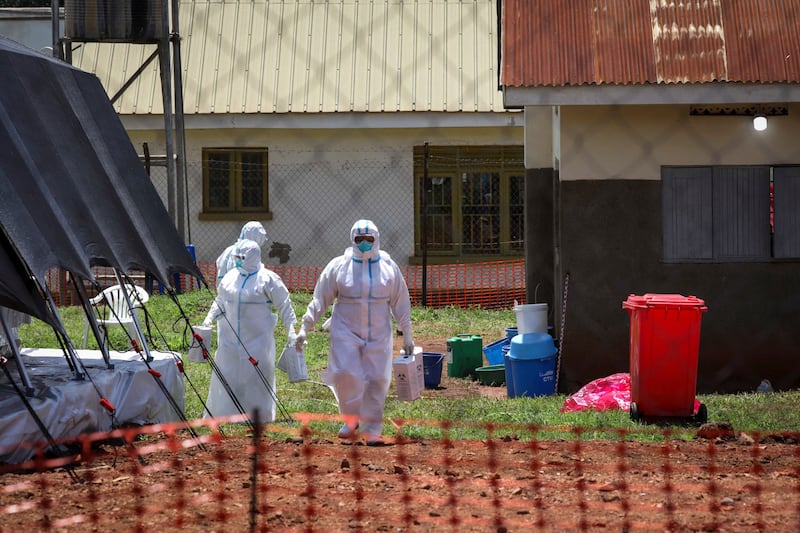An outbreak of Ebola virus disease is spreading in central Uganda, according to the Centers for Disease Control and Prevention, which issued an advisory about the outbreak Thursday.
And while the national public health agency says the risk in the United States is low and there are no cases identified, federal health officials told healthcare providers to watch for signs that the disease is here, according to The New York Times, which also reported that the Biden administration said on Thursday that travelers flying into the United States from Uganda would be diverted and screened.
According to a Level 3 travel advisory from the State Department, “all U.S.-bound passengers who have been in Uganda in the 21 days prior to their arrival” will be sent to be screened for Ebola at one of five U.S. airports: Atlanta, Chicago, New York, Newark and Washington, D.C.
“The enhanced screening applies to all passengers, including U.S. citizens, lawful permanent residents, and visa holders (to include Diplomatic and Official visas),” the advisory stated.
The CDC also suggests that clinical laboratories “review information on specimen collection and transport and packaging and shipping for specimens suspected to contain Ebola virus.”
Nature reported that at least 64 people in Uganda are believed to have a rare species of Ebola virus for which no vaccines or treatment are available.” The articles said that 30 have died as the virus spread quickly across five districts in the African nation and “raised fears that the outbreak will not be easy to contain.
John Drake, a University of Georgia professor, wrote in Forbes that stopping the virus spread needs to be a high priority.
“The current outbreak in Uganda is a reminder that a globally connected society is vulnerable to infectious diseases regardless of where they emerge,” Drake wrote. “Stopping outbreaks at the source is far more cost-effective than mitigating transmission after a pathogen is widespread. Whatever aid Uganda requires to get the current outbreak under control will no doubt be well worth the investment.
About Ebola
Ebola is a rare and deadly disease that can be found in both people and other primates. CDC says people can get infected through direct contact with an infected bat or primate, or a sick or dead person who was infected with the virus.
The Nature article said the death rate from Ebola has in the past ranged from 25% to 90%. Sometimes, it can be dormant in someone and then spread to others, even years later.
Early symptoms include fever, vomiting, headaches and fatigue, but it can quickly spread to internal organs, which can lead to hemorrhaging and bruising. CDC says red eyes, skin rash and hiccups at the late stage can occur.
Those symptoms can appear from 2 to 21 days after contact with the virus.
No vaccine available
While drug companies developed vaccines and treatments for one form of Ebola after an epidemic that lasted from 2013 to 2016, Nature reports that therapies are still being developed for Sudan ebolavirus, which is what is killing people right now in Uganda. There’s no vaccine or treatment on the market against it at the moment.
The World Health Organization says that four of the five previous Ebola outbreaks were Sudan ebolavirus. The international public health agency also said that just four people have recovered in the current Ugandan outbreak.


